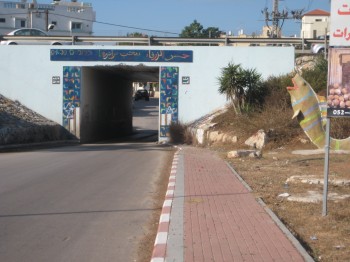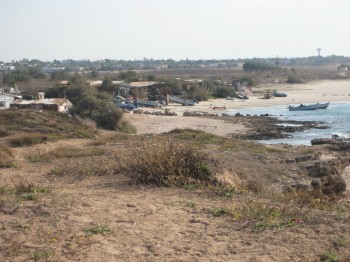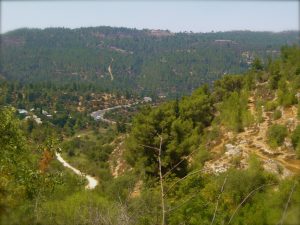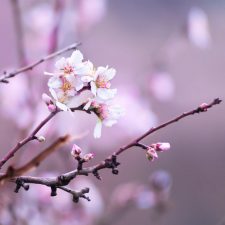 Jisr al Zarka, as seen from Tenenim Stream estuary
Jisr al Zarka, as seen from Tenenim Stream estuary
Anyone visiting Israel’s remaining coastal Arab town, Jisr al Zarka may notice almost immediately how different it is from its more affluent neighbors, Caesarea and Kibbutz Maagan Michael. For Jisr al Zarka, a town of almost 13,000 inhabitants, does not have a bank or ATM machine, a public transport line to it, and those who enter or leave it must do so by means of either a tunnel under the main coastal highway, or a small bridge leading to the adjoining Tenanim Stream nature reserve.

Jisr’s “tunnel entrance” and fish statue
Despite all of its problems, Jisr al Zarka’s municipal authorities, especially its Mayor, Az-Adin Amash, want to promote regional environmental tourism to the town and its beachfront, which up to now has been largely neglected. Mayor Amash and the town’s media bureau head, Muhammad Amash, hope to add their town to a list of locations being promoted as eco-tourism sites in the region.
What is helping to do this is the town’s proximity to the Tenenim Stream Nature Preserve that adjoins Jisr’s back door.
As said by Muhammad Amash during a recent media tour to the town, said in the Jerusalem Post:
“Jisr al Zarka’s story is important to tell to everyone. This town has been here, in the same location, for more than 500 years. It was settled by people who lived in the Kabar swamps, which covered areas now including the Jewish cities of Hadera and Binyamina. The original inhabitants were known as ‘swamp people,’ and made their livelihood from the natural reeds and other products of the swamp. In other words,” said Amash, “people literally lived from these swamps.”
Mayor Az-Adin Amash calls his town “the most beautiful place on earth” and says that European investors are ready to invest as much as 50,000 Euro in eco –tourism projects to attract visitors to the town’s beachfront, which is presently occupied by a rustic “fisherman’s village” which has neither proper sewage or electricity installations.
“We don’t need government funds as much as we need permission from the Israel Lands Administration to develop our beachfront and other areas for these tourism projects. We also need a more direct access road to the main coastal highway. Although we own the property adjacent to the highway, we still no direct access to it”, he says.
 Beachfront, Fisherman’s Village
Beachfront, Fisherman’s Village
Promoting the town’s tourism potential is also being done by an Israeli NGO named Sekkuy (“chance” in Hebrew), which is now involved in working with a number of minority towns and villages to improve both their infrastructure, as well as their employment and socioeconomic opportunities. Sekkuy is also working on a number of projects in the Wadi Ara region, not far from Jisr al Zarka.
Sekkuy’s Co-Director, Ron Gerlitz, who was present on the media tour, told the participants that a lot still needs to be done to give the town the tourism and other economic opportunities it needs to benefit its residents. Says Gerlitz:
“All of the negative aspects of this town, including high crime rate, high dropout rates in schools, and low incomes of many of the inhabitants are due to a combination of factors that still weigh heavily on the people who live here and hamper their ability to improve their lot. I believe that strengthening the local community, as we in Sikkuy do, creating cooperation on the regional level, and investment by the government can change the picture of this town significantly within a decade.”
More on eco-tourism options in Israel
Go on a Volunteer Eco-Tourism Adventure in Israel With Go-Eco
Searching for a Clean Stream in Israel – or Anywhere
Kishon River Goes From Industrial Wastes and Sewage Canal to Nature Park in Only a Decade




My husband and I drove through Jisr one day in 2009 after visiting Tenanim Stream nature reserve. We were looking for a cafe to stop in, as a way of supporting the local economy. We were very disappointed to discover that there was not one public cafe or restaurant, so I am glad to see that the local residents would like to attract tourism.